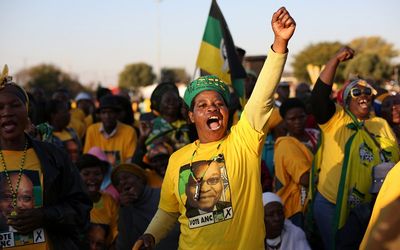Politics are shifting, but ANC is still a powerful force
by George Devenish
2016-08-20 09:26:30.0
BEFORE the local government elections on August 3, SA could have been accurately described as a dominant party state democracy.
This was due to the ANC securing 63% in the local government elections of 2011. In this election, its support diminished to 53.91%. A paradigmatic change has occurred with its support having dwindled to not merely less than 60%, but below 55%.
A change in political paradigm has occurred. The results illustrate in no uncertain terms that the days of ANC hegemony in South African politics are over and that a system of strong multiparty democracy is emerging. This is accompanied by the loss of three important metros and the need for coalition governments in them.
The emergence of strong multiparty system in place of ANC hegemony in our political system is due in part to the growth of the DA and the EFF, which respectively obtained 26.9%, up from 24%, and 8.19%, up from 6.4% in the general election of 2014.
What must also be taken into account is that the ANC performance has for some time been in decline, bearing in mind that the ANC after being in office for more than 20 years. This has occurred with other liberation movements, such as the Congress Party of India. This state of affairs may not be easily arrested and as a result the national and provincial elections due to be held in 2019 can be predicted to follow this trend.
From the point of view of democracy, this is a healthy political development and indicates that a maturation is taking place in our politics. Nevertheless, the ANC remains a political force to be reckoned with, having twice the support of its nearest rival. What is clear from an analysis of the election results is that ANC cannot merely as a former liberation movement take the support of African voters for granted, many of them, particularly in the urban metros, did not vote in the 2016 local government elections. It has also quite clearly lost any remaining support it had of the minorities, coloured, Indian and white.
Under the presidency of Jacob Zuma, the ANC has become a racially nationalist African party, oblivious to the needs of minorities, coloured, Indian and white. Meaningful introspection, if successful, must take it back to its nonracial origins and creed and indeed the re-emergence of the famous rainbow nation.
What is clear from the above and from the emergence of coalition governments in the urban metros of Tshwane, Nelson Mandela Metropole and Johannesburg is that the party political scene is in the process of significant transition. This is a beneficial development that should lead to improved service delivery, greater transparency, accountability and less corruption.
The ANC as a political party should engage in a period of profound introspection concerning its overall electoral decline as seen in the results of the local government elections. This could lead to genuine renewal and invigoration. This will not be easy, as most commentators are of the opinion that renewal and invigoration of the party would at the least require that Zuma relinquish his position as president of the country. However, on this cardinal issue the party is profoundly divided, as Zuma has both his detractors and supporters. The latter invariably enjoy patronage that flows from their support and allegiance to him. A political struggle concerning the position and personality of Zuma could result in unintended consequences, since this could involve the tripartite alliance, which could start to unravel.
Nevertheless, the ANC although in decline, remains a force to be reckoned with. It is a party with a great liberation history, of which it can be justly proud with many leaders of competence and integrity, but unfortunately others who do not and who constitute a political liability. This is why introspection, reflection and renewal are essential for it and SA.
Furthermore, with the emergence and operation of coalition governments in the metros and other cognate issues such as the probable fracturing of the tripartite alliance could bring about a re-orientation of political parties based on economic policy rather than race, political allegiance and personalities.
It is a time for political optimism and not pessimism in this great country, which has inordinate potential with great natural and human resources. The latter are found in all the political parties and in civil society. The results of the local government elections and the prospect of coalition governments in the sphere of local government, present us with a new and exciting challenge in our democratic experience. Also the local government election results, requiring the need for and making of political coalitions can be interpreted as the sending of a powerful message from the electorate to the political leaders of SA in order to start with a process of negotiation and working together in a mature manner for the benefit of the nation and its people and to stop the kind intra-political fighting that causes great damage to the fabric of the nation. I have no doubt that the leaders and people of SA with its diverse communities, will rise to the occasion.
• Devenish is emeritus professor at the University of KwaZulu-Natal and one of the scholars who assisted in drafting the interim constitution in 1993.

ANC supporters. Picture: REUTERS/SIPHIWE SIBEKO
BEFORE the local government elections on August 3, SA could have been accurately described as a dominant party state democracy.
This was due to the ANC securing 63% in the local government elections of 2011. In this election, its support diminished to 53.91%. A paradigmatic change has occurred with its support having dwindled to not merely less than 60%, but below 55%.
A change in political paradigm has occurred. The results illustrate in no uncertain terms that the days of ANC hegemony in South African politics are over and that a system of strong multiparty democracy is emerging. This is accompanied by the loss of three important metros and the need for coalition governments in them.
The emergence of strong multiparty system in place of ANC hegemony in our political system is due in part to the growth of the DA and the EFF, which respectively obtained 26.9%, up from 24%, and 8.19%, up from 6.4% in the general election of 2014.
What must also be taken into account is that the ANC performance has for some time been in decline, bearing in mind that the ANC after being in office for more than 20 years. This has occurred with other liberation movements, such as the Congress Party of India. This state of affairs may not be easily arrested and as a result the national and provincial elections due to be held in 2019 can be predicted to follow this trend.
From the point of view of democracy, this is a healthy political development and indicates that a maturation is taking place in our politics. Nevertheless, the ANC remains a political force to be reckoned with, having twice the support of its nearest rival. What is clear from an analysis of the election results is that ANC cannot merely as a former liberation movement take the support of African voters for granted, many of them, particularly in the urban metros, did not vote in the 2016 local government elections. It has also quite clearly lost any remaining support it had of the minorities, coloured, Indian and white.
Under the presidency of Jacob Zuma, the ANC has become a racially nationalist African party, oblivious to the needs of minorities, coloured, Indian and white. Meaningful introspection, if successful, must take it back to its nonracial origins and creed and indeed the re-emergence of the famous rainbow nation.
What is clear from the above and from the emergence of coalition governments in the urban metros of Tshwane, Nelson Mandela Metropole and Johannesburg is that the party political scene is in the process of significant transition. This is a beneficial development that should lead to improved service delivery, greater transparency, accountability and less corruption.
The ANC as a political party should engage in a period of profound introspection concerning its overall electoral decline as seen in the results of the local government elections. This could lead to genuine renewal and invigoration. This will not be easy, as most commentators are of the opinion that renewal and invigoration of the party would at the least require that Zuma relinquish his position as president of the country. However, on this cardinal issue the party is profoundly divided, as Zuma has both his detractors and supporters. The latter invariably enjoy patronage that flows from their support and allegiance to him. A political struggle concerning the position and personality of Zuma could result in unintended consequences, since this could involve the tripartite alliance, which could start to unravel.
Nevertheless, the ANC although in decline, remains a force to be reckoned with. It is a party with a great liberation history, of which it can be justly proud with many leaders of competence and integrity, but unfortunately others who do not and who constitute a political liability. This is why introspection, reflection and renewal are essential for it and SA.
Furthermore, with the emergence and operation of coalition governments in the metros and other cognate issues such as the probable fracturing of the tripartite alliance could bring about a re-orientation of political parties based on economic policy rather than race, political allegiance and personalities.
It is a time for political optimism and not pessimism in this great country, which has inordinate potential with great natural and human resources. The latter are found in all the political parties and in civil society. The results of the local government elections and the prospect of coalition governments in the sphere of local government, present us with a new and exciting challenge in our democratic experience. Also the local government election results, requiring the need for and making of political coalitions can be interpreted as the sending of a powerful message from the electorate to the political leaders of SA in order to start with a process of negotiation and working together in a mature manner for the benefit of the nation and its people and to stop the kind intra-political fighting that causes great damage to the fabric of the nation. I have no doubt that the leaders and people of SA with its diverse communities, will rise to the occasion.
• Devenish is emeritus professor at the University of KwaZulu-Natal and one of the scholars who assisted in drafting the interim constitution in 1993.
























